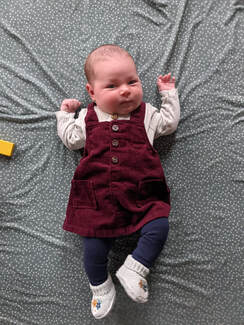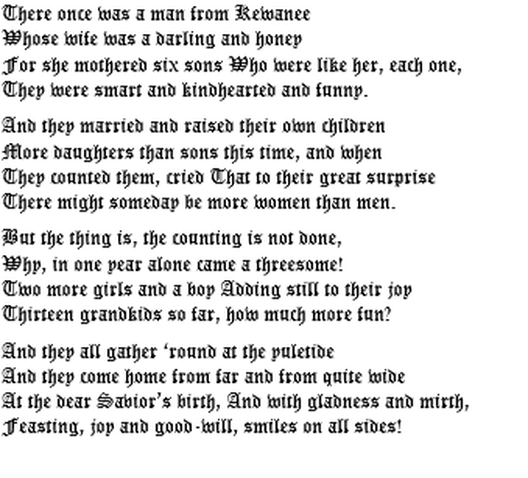|
Newsletter
12/20/2021 January 2022God rest ye merry, this Christmas 2021 and always!
– the Eckardts St. Paul’s Evangelical-Lutheran Church 109 S. Elm, Kewanee, Illinois 61443 Newsletter Volume 34 January 2022 No. 1 Master of Disguise (Excerpts from an article in the Christmas 2021 issue of Gottesdienst by Pastor Eckardt) Christmas is a great time to consider the humility of Christ and then to apply what we know about it to everything else in life. Everyone knows about and loves the lowly stable (most likely it was a cave), the ox and ass, the manger, and the simple shepherds at the simple birth of Christ. It’s worth pondering not only for its simplicity but also for the realization that these were the most dreadful of conditions. It was most likely in the middle of winter and, therefore, cold. British poet Christina Rosetti, one of the Victorian age’s finest, had it right: In the bleak midwinter / Frosty wind made moan / Earth stood hard as iron / Water like a stone / Snow had fallen, snow on snow / Snow on snow / In the bleak midwinter / Long ago. Gustav Holst famously and marvelously set this to music to make it a most beloved carol. Added to this cold winter night was the frantic situation in which Joseph found himself with a pregnant wife soon to give birth and nowhere to turn in. Roman law required them to go to Bethlehem at once, at the worst of possible times for them. Though the lineages of both Joseph and Mary were the line of David, there were evidently no family members or relatives for them to count on when they arrived, already at the last minute. Mary’s cousin Elizabeth lived in the hill country, not near enough by. The Child was ready to be born, but they were clearly not ready for it to happen. There was no room for them in the inn, as we are all aware. We are told of no friendly innkeeper to offer them his barn. I’ve always been amazed at the suggestion that such an innkeeper could be called friendly, but none is mentioned anyhow. The only innkeeper mentioned in the Bible is in the parable of the Good Samaritan. Popular belief that there was an innkeeper likely arises from children’s Christmas plays. In reality, however, there was nowhere to go, and lest she give birth in the street, they seem to have had no choice but to turn in at the nearest shelter they could find. It was cold, it was dreary, they were alone, it was night, and there was no room anywhere. Those were the desperate circumstances of Jesus’ birth. Meanwhile, the glory of the Lord shone round about the shepherds in a nearby field, though it did not shine round about the creche. The shepherds had quite a sight to see that night, but not this poor fledgling family. And speaking of those shepherds, they were already lowly men, in a sense themselves possibly the emblem of the despised caste that all Jews were in the eyes of the other nations, dating back to the days of the Egyptian farmers who, in spite of anything they respected about Joseph, would not have wanted shepherds anywhere near them (“every shepherd is an abomination to the Egyptians,” Gen 46:34). If the legend that shepherds were universally despised isn’t true, we can at least say this much, that they were essentially peasants. They weren’t aristocracy or nobility. But on Christmas Eve they became the most privileged of all men, for they saw a countryside filled with angels singing the premiere of the opening words of the Greater Gloria. Yet what is startling is that the sign given to them by which they would find the newborn Christ the Lord was no such glorious sight, but its virtual opposite: a babe wrapped in swaddling clothes, lying in a manger. Consider the sign: it betokens dearth, not majesty. It is meager, not mighty. It is all disguise, marvelous disguise. The marvel of the disguise is magnified when we consider who is disguised here, namely the Almighty God in the flesh. This reality is commonly missed by the general public who, while they know and love the simplicity of the lowly birth, do not quite know whose birth this is. Even many brands of Christians do not quite know. For although they will readily confess that Jesus is God, they are not so swift to confess that this humility is not merely the humility of Jesus but the humility, therefore, of God.. . . He, and no other, is the Master of Disguise here. That this Child is the Almighty Creator of all certainly magnifies the marvel of His nativity. And therefore, it is appropriate and helpful to apply this truth to everything in Christian life. The balm and comfort of the Gospel is not only to know the forgiveness of sins, life, and salvation—though, to be sure, that is the heart of the matter—but, in addition, to see this disguise for what it is. For to see that this is God’s way of revealing Himself to us, is to begin to understand why Christian faith is never the way of despair. The circumstances in which Mary and Joseph found themselves were certainly desperate, but they were not an occasion to despair. They were ordained of God; they were His manner of working with us. They are His manner of working with us. This is what Luther would call the theology of the cross. In his Heidelberg Disputation of 1517, Luther spelled out four important things that comprise this theology of the cross: 19. That person does not deserve to be called a theologian who looks upon the invisible things of God as though they were clearly perceptible in those things which have actually happened [Rom. 1:20]. 20. He deserves to be called a theologian, however, who comprehends the visible and manifest things of God seen through suffering and the cross. 21. A theologian of glory calls evil good and good evil. A theologian of the cross calls the thing what it actually is. 22. That wisdom which sees the invisible things of God in works as perceived by man is completely puffed up, blinded, and hardened. (AE 31:40). . . . Simply put, since the cross of Jesus is not evil but good, as every Christian knows, therefore the suffering of the Christian is also not evil but good since it is the means by which God brings him to the humility of seeing his worth only in Christ and not in himself. . . . And so the theology of the cross, of the manger, is a most comforting thing to learn, especially when shameful, difficult, or dreadful circumstances in life arise, whether they be personally difficult, liturgically difficult, societally difficult, difficult in any way at all. Dreadful circumstances tend to elicit sorrow and despair, as they suggest that God is not here, and there is no help. But all such suggestions vanish with a reminder that the Almighty God is the Author of the theology of the manger and the Master of Disguise. First Tuesday events Our First Tuesday Elders meeting is scheduled as usual. Tuesday, January 4th after First Tuesday Vespers which is at 6:45 pm January Anniversaries None Altar Guild Notes Altar color is white through January until the 31st, which is Septuagesima Sunday, when the color changes to violet. No Council Meeting in January The January council meeting is unnecessary this month because of the annual voters’ assembly to be held January 2nd. Annual Voters’ Meeting Our Annual Voters’ Meeting is scheduled for Sunday, January 2nd, at 10:00 a.m. (in the time slot normally reserved for Bible Class). January Birthdays 1/1 Chris Erickson 1/13 James Hornback 1/15 Breann Dooley January Ushers Jim Hornback, Tom Wells, Steve Kraklow Shut ins Emmy Wear is at Williamsfield Home in Williamsfield; Emilie Ricknell is at home; Dick Melchin is at Hammond Henry Extended Care in Geneseo; Dale Baker is at home; Jewneel Walker is at Kewanee Care; Bea Harris is occasionally at home. The Bell Does Not Toll On the last Sunday of the year (next Sunday) we would remember the members who fell asleep in Christ during the year, but this year there were none, for which we thank God. Annual Voters’ Assembly Our Annual Voters’ assembly is on January 2nd at 10:30. In Our Prayers Our current list of prayer intentions at mass includes the names on the lists here following. Anyone wishing to update the list by addition or subtraction, please inform the pastor.in our parish: Bill Thompson, Emilie Ricknell, John Ricknell, Linda Rowe, Emmy Wear, Don and Sue Murphy, Dick Melchin, Bea Harris, Allan Kraklow, Sandra VerPlaetse, John Sovanski, Grant Andreson, Dale Baker, and Jewneel Walker and beyond our parish: Anna, Katy, and Jody Rutowicz [Harris relations], Julie Ross [Svetlana Meaker’s daughter], Elizabeth Godke [Sharon Field’s mother], Oneida Hendrickson [Ricknell relative], Janice Hart [Judy Thompson’s sister], Caleb Cleaver [Ricknells’ grandson], Dennis Hoag, Tim Newman [Shreck relations], Theresa Moore [Ricknells’ niece], Kathy Boeger [re Harrises], Allison Leezer [relative of the Kraklows], Everly Stoner, Marvin Brown, Shannon Watson [Jim’s daughter], Matt Verplaetse, Maxine Bitting [Judy Thompson’s sister in law], Loren Hartz [Sharon’s brother], Yvette Baker [Dale Baker’s daughter-in-law], Karen Parker [Dale Baker’s sister], Rosemary Bloome [Don Murphy’s cousin], Richard Heiden [Carol Eckardt’s father], Troy Kelly [friend of the Murphys], Pastor Jacob Sutton, Pastor Justin Kane [relative of Diana Shreck] in the military John Eckardt, Donny Appleman [at request of the Ricknells] Richard Heiden [at request of the Eckardts], Luke Van Landigan [grandson of Dick Melchin], Jaclyn Alvarez [daughter of Kris Harden], Eli Wetzel, Traven Wetzel [relatives of Kris Harden], Eric Verplaetse [Sandra’s grandson], Jake Mahaffey, Trevor Shimmin, Shad Draminski James and Ann Lee Armstrong In trouble any unborn children in danger of abortion those suffering from unrest, persecution, and imprisonment in Nigeria, Algeria, Sudan, Madagascar, Iran, Iraq, Syria, India, China, Vietnam, North Korea, and elsewhere. Christmas Program Includes Music from a Play Written and Composed by Pastor in 1988 Under the direction of Cantor Peter Eckardt, the first-to-third-graders at St. John Lutheran School in Mattoon, Illinois, presented a Christmas program on December 14th that was first sung in 1988 by the grade schoolers at St. John Lutheran Church in Berlin, Wisconsin, as part of a musical play “The Christmas Nobody Noticed,” entirely written, composed, and directed by Pastor in 1988 in Berlin, Wisconsin, where he served as Associate Pastor at St. John Lutheran Church and School. The play was performed there also in 1990 under his direction, when his son Peter participated as a preschooler, and again at Our Father Lutheran School in Greenfield, Wisconsin a few years after that. After a 31-year dormancy, this year the music from that play was discovered in the Eckardt basement and dusted off for use in the program. Pastor and Carol were present at the performance, which may be viewed at https://www.facebook.com/stjohnslutheranmattoon/videos/398277582082667 St. Paul’s Ev. Lutheran Church 109 S. Elm Street Kewanee, IL 61443 Comments are closed.
|
AuthorWrite something about yourself. No need to be fancy, just an overview. Archives
May 2024
Categories |




 RSS Feed
RSS Feed